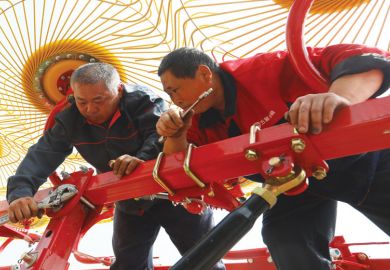Here we have a scholastic journal with a difference. It is produced primarily by students at the Graduate School of International Relations and Pacific Studies at the University of California, San Diego. The students do a good job. During a recent visit to the university, I watched them at work. They are organised and rigorous in their approach. Moreover, the students run the journal as a pro bono exercise; they do not generally receive academic recognition in the form of course credits, so they must undertake their journalistic tasks in their spare time. More power to them because the product of their efforts is an estimable addition to the literature.
Of course the students receive plenty of backup from the overall editor and his two assistants. There is also an editorial board with luminaries such as David Pearce, chairman of economics at University College London; Jose Goldemberg of the University of Sao Paulo; Robert Repetto of the World Resources Institute in Washington DC; and Peter Sand of the University of Munich. But in the main, it is the students' show: they plan it, oversee peer review and they decide whether to give a final thumbs-up to a contentious article.
The journal is a review of international policy on environment and development writ large, which is to say that it covers a spectrum of issues such as pollution, climate change, agriculture, population, consumption and resource economics. It invites submissions in areas as eclectic as "the interaction between trade and the environment; the role of institutions in environmental governance; analysis of international environmental agreements; the impact of environmental regulation on investment patterns; legal and scientific issues related to sustainable development; the role of the insurance industry in environment and development; and the impact of property rights on development". In particular, the journal "seeks to further research and debate on the nexus of environment and development issues at the local, national, regional and international levels. (It) provides a forum that bridges the parallel debates among policy-makers, attorneys, academics, business people and non-governmental organisation activists from all regions of the world."
This is an ambitious agenda, which the journal manages to handle with success. The past six years' issues have carried articles on pollution control in Brazil, carbon pricing in industrialised countries, the World Trade Organisation's impact on environments worldwide, the Mexico/United States border zone, the elephant ivory trade, acid rain in Europe, technology cooperation between north and south, the North American Free Trade Agreement's side agreement on environment, debt relief and environment, the United Nations population conference, fisheries quotas, the tropical timber trade and the convention on biodiversity. Moreover, articles have been written by academics of international stature: Nancy Birdsall, vice-president of the Latin American Development Bank; Bill Reilly, former head of the US Environmental Protection Agency; Hilary French, a leading analyst at the Worldwatch Institute; Bruce Rich, NGO scourge of the World Bank; Jeff McNeely, director of biodiversity at IUCN; and Stephen DeCanio, the University of California economist who persuaded 2,500 of his economist colleagues, including eight Nobel Laureates, to sign a statement that global warming would cause enough damage to justify preventive measures, thus running counter to those many other economists who have asserted that we would wreck our economies if we tackled a problem that is a non-problem anyway.
There are at least a dozen other journals dealing with environment and development, and with emphasis on policy. They all have their merits, while being overly similar. This one stands out for its frequent focus on environment and development as a composite entity, increasingly known as sustainable development. The organiser of the Rio Earth Summit, Maurice Strong, used to say that his mission was queered from the start by the United Nations' insistence on the conference title, "Environment and development"; the "and" implied the two were somehow different and separate, even antithetical, whereas they are intrinsically complementary, mutually supportive. There can be no development in the long run without safeguards for the environmental underpinnings of economic activity; and there can be no ultimate safeguards for environment without development insofar as the 1.3 billion poorest of the poor, the people with a cash income of 50p per day, are driven by their poverty to torch rainforests, desertify savannahs, and cause more environmental mayhem than all the 3 billion other people in developing countries.
All in all, then, this journal is sound value. The subscription cost is substantial, but the costs of doing without could be a good deal greater. Even if it were an "also ran" publication, I would still applaud it for the sake of the students who produce it: there is nothing like learning by doing.
Norman Myers is visiting fellow, Green College, University of Oxford.
The Journal of Environment and Development
Editor - Gordon J. F. MacDonald
ISBN - ISSN 1070 4965
Publisher - Sage
Price - £80.00 (institutions) £36.00 (individuals)
Register to continue
Why register?
- Registration is free and only takes a moment
- Once registered, you can read 3 articles a month
- Sign up for our newsletter
Subscribe
Or subscribe for unlimited access to:
- Unlimited access to news, views, insights & reviews
- Digital editions
- Digital access to THE’s university and college rankings analysis
Already registered or a current subscriber?



